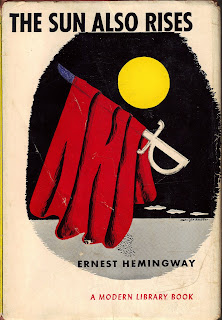Right from
the start of The Sun Also Rises and
until the end, Hemingway brims with a hard boiled masculinity. It’s quite
apparent that his writing style is that of a man’s man. Aside from kung fu
flicks and comic books, few stories channel so much raw masculine energy.
Looking at
the way he constructs sentences, without recognizing the deeper meanings, I get
the sense that he's throwing flurries of verbal jabs in the form of short,
concise, to-the-point sentences. His persistent, hard-hitting brevity reveals his
robust masculinity.
Ironically,
Hemingway writes about a guy named Jake who struggles with sexual impotency, and that name also ironically brings to mind one of the most sexually
potent people in the Bible - Jacob. It’s intriguing
that a manly man such as Hemingway would create a main character with a physical inadequacy that was in stark contrast to his dynamic, real life persona. It seems that Jake is a way for Hemingway to
contemplate his own identity. I wonder
if he was trying to redefine gender roles.
I wonder if he was trying to make a statement on the underlying
powerlessness that exists beneath the surface of man’s supposed masculinity.
Even Jake’s
love interest, Brett, exudes masculinity. She bears a manly name, banters in manly
ways, cuts her hair in manly fashion, and also refers to herself as a “chap.” In fact, she comes across as more masculine
than most of the male characters. Jake, along with the rest of the men, deals
with various insecurities and feelings of inferiority while Brett remains
confident and unflappable, basically dominating the others with her flair and promiscuity.
What was Hemingway’s intention and inspiration for such a woman? Was he trying
to describe the emancipated woman of the 1920s? Was he trying to reassess
gender roles? Was he painting a portrait of his ideal woman? Was Brett a
manifestation of latent homosexuality? I
don’t know, but I wonder.


